Text
i don't know man, i just wish that we could [suddenly realising i'm coming dangerously close to expressing a real and earnest thought instead of filtering everything through several layers of intangible running bits] blow up the entire world. or something.
71K notes
·
View notes
Text
4 Reasons Schizoids With Anhedonia Can Still Have a Strong Survival Instinct
Schizoid personality disorder is a complex and multifaceted condition that contains many paradoxes. This is primarily related to the internal fragmentation of the self and inner splits between different aspects of their being. One seemingly contradictory aspect is related to why schizoid individuals who experience anhedonia can still possess such a strong survival instinct. This can be partially explained by their heightened sensitivity to safety. This article aims to explore the relationship between anhedonia, the survival instinct, and the schizoid's underlying safety sensitivity.
1. Understanding Anhedonia in Schizoids
Anhedonia, in essence, is the inability or diminished capacity to experience pleasure from activities usually found enjoyable. For the schizoid individual, this might manifest in a lack of interest in social interactions, hobbies, or even basic human experiences. With such a significant reduction in the pleasure derived from life's experiences, one might assume that the will to live or survive would be diminished. However, the schizoid dynamic is far more nuanced.
2. Schizoid Inner Pleasures
Anhedonia is related to the lack of pleasure from engaging in activities. However, because schizoids live primarily in their heads, their main source of pleasure tends to come from thinking, rather than taking action. Schizoids tend to be creative and have a rich inner world, from which they may derive a lot of pleasure. For some schizoids, pleasure is derived from being a passive observer of the world. This means that even with anhedonia, there is potential for gaining worthwhile pleasure from being in existence.
3. The Strong Survival Instinct
Despite their emotional detachment and diminished drive due to anhedonia, many schizoids exhibit a strong survival instinct. This means that survival doesn't necessarily stem from a passion for life, as experienced by many neurotypical individuals. Instead, it may be rooted in a fundamental desire for self preservation and safety. The world, as perceived through the lens of a schizoid, can often seem threatening or overwhelming. This perspective, combined with their inherent desire to avoid harm, means that survival is not just about living for external rewards, but about preserving a state of safety and true self survival. It's not merely a biological impulse, but a deeply ingrained psychological need.
4. Schizoid Safety Sensitivity and Defenses
Central to understanding the schizoid survival instinct is the concept of their underlying safety sensitivity, which may be conscious or unconscious. This sensitivity to safety isn't just about physical harm but extends to emotional and psychological well-being. Therefore, schizoids often feel a pressing need to protect their true self from the outer world. The external world, with its demands, judgments, and potential threats, is navigated with caution. Any threat to their well-guarded inner sanctuary is met with a strong defense mechanism, whether that's through withdrawal, avoidance, distancing, or masking. By avoiding negative attention, they safeguard their inner world from external threats.
Summary…
The schizoid personality with its complex thought processes, behaviors, and feelings, defies simplistic explanations. Their strong survival instinct, despite experiencing anhedonia, is a testament to the human psyche's resilience and adaptability. For the schizoid, the world is a complex puzzle of potential threats and safe havens, with survival not just being about life but about the preservation of their true self. As we seek to understand those with schizoid dynamics, it's of value to approach their experiences with empathy and open-mindedness, recognizing the depth and richness of their internal worlds and the strength it takes to navigate a world that often feels overwhelming.
Video From My YouTube Channel: The Schizoid Defense
93 notes
·
View notes
Text
I'm a 47 year old man with schizoid personality disorder. I've been this way my whole life. I always knew I was different but I only found out about SzPD about 5 years ago.
Just want to share with you younger schizoids that it's not an easy life but it's a true and valid one, it's all yours and no one else's and you don't need to feel bad about that. You are who you are. Normies aren't ever going to understand how you can be happy living like you do, but that's fine. DO NOT make the mistake of thinking you're missing out on the good life just because they're happy with relationships and families and whatnot, and you don't have those things. You would NOT be happy with those things. So live your best life your own way, and don't fall for the trap of thinking you aren't allowed to be happy in your own way. Old man schizoid out
103 notes
·
View notes
Note
Schizoid culture is stop freaking pitying me, why the hell YOU feel bad for me? It's not even your problem and even then I don't feel bad about it, I don't give a damn how you emotionally feel about my situation, keep it to yourself and leave me alone
-
52 notes
·
View notes
Text
i ended therapy i started in January precisely for the reasons I didn't even want to start it. it's still all sinking in. the things the therapist suggested are actually insane. i mean, i have considered all of them to be honest, but to hear them from a professional? man.
#schcomtalk#sorry about being vague i am a schizoid after all lmao#and i dont even have it all processed yet#so maybe i will share more later#or if youre curious you can ask#idk man
5 notes
·
View notes
Text
OCD symptom i struggle with but don't see talked about a lot: inability to trust your own memory and/or perception.
as an example: i put my headphones in my bag. i say im sure they're in my bag, but what if i imagined putting them in my bag? i have to check, so i stick my hand inside and grab them. but then i have to check *again* because what if i just so happened to have another object shaped and sized exactly like my headphones that i just forgot about? so i have to pull them out of my bag and look directly at them to fully confirm they were in my bag
this is a fairly benign example but this also happens with other worse scenarios for me and it's. not fun
#you know what ive started therapy this year again#and I'm wondering if i dont have ocd also on top of the ocpd too#sigh
3K notes
·
View notes
Text

#my ocpd is taking over the schizoidism lately#i think its the antidepressants#dont get me wrong im still a schizoid just a workaholic also now
57K notes
·
View notes
Text
Fuck, man. Neurodivergent love. I’m never going to get over it. Depression love says “I will do my best to stay for you.” DID/OSDD love says “Every face of this brain is endeared to you.” Autism love says “I will do anything to reach you, to give you the understanding I never got.” BPD love says “You are a vital organ of mine, and I am one of yours.” Bipolar love says “Wherever I may go, I will come back to you.” Post-traumatic love says “I will always show you gentleness in this reckless world.” ADHD love says “I will try for you, no matter the obstacle.” Anxiety love says “You are my safe space and I am yours.” ASPD love says “I choose to, on purpose, for you.” OCD love says “I will stand guard for you.” Neurodivergent love. Neurodivergent love. Different brains in love, oh my G-d. These colors are uncountable and they are my religion.
2K notes
·
View notes
Text
OCPD love is: I will add time with you to my schedule.
SPD love is... uh...
Fuck, man. Neurodivergent love. I’m never going to get over it. Depression love says “I will do my best to stay for you.” DID/OSDD love says “Every face of this brain is endeared to you.” Autism love says “I will do anything to reach you, to give you the understanding I never got.” BPD love says “You are a vital organ of mine, and I am one of yours.” Bipolar love says “Wherever I may go, I will come back to you.” Post-traumatic love says “I will always show you gentleness in this reckless world.” ADHD love says “I will try for you, no matter the obstacle.” Anxiety love says “You are my safe space and I am yours.” ASPD love says “I choose to, on purpose, for you.” OCD love says “I will stand guard for you.” Neurodivergent love. Neurodivergent love. Different brains in love, oh my G-d. These colors are uncountable and they are my religion.
2K notes
·
View notes
Text
sorry my family didn’t teach me that i have a place among others so now i’m weird . sorry
50K notes
·
View notes
Text
[on the verge of having a complete breakdown] i need to make some kind of list or perhaps sort things into categories
81K notes
·
View notes
Text
“Don’t let your disorder define you”
Okay but do you support the people whose disorders do define them?
Do you support people with the chronic illnesses who have had to develop whole lives around their conditions? Do you support the intellectually disabled people whose whole way of thinking is defined by their disorder? Do you support the people with personality disorders who literally have a disorder as a personality? Do you support the autism/ADHD people whose disorder you can’t separate from who they are? Do you support the DIDOSDD people who have multiple definitions of themselves because of their disorder?
Or are you just saying that because a disorder defining someone means you can’t ignore it.
4K notes
·
View notes
Text
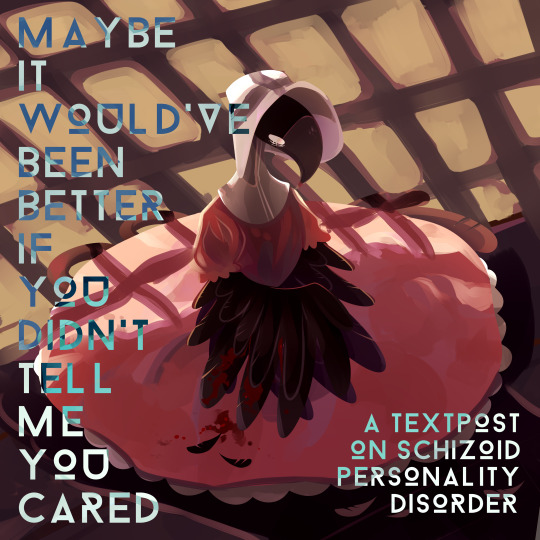
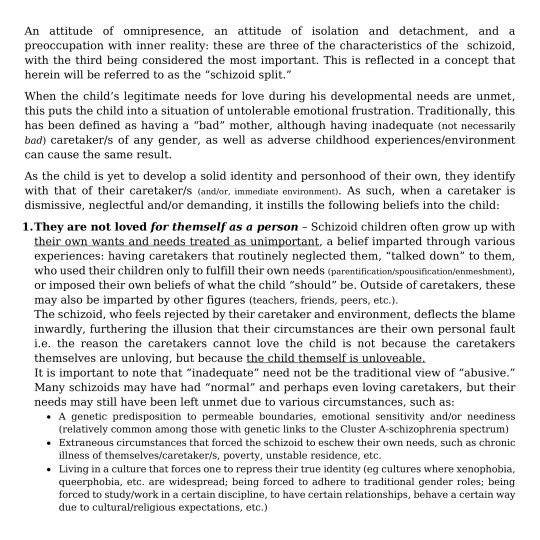
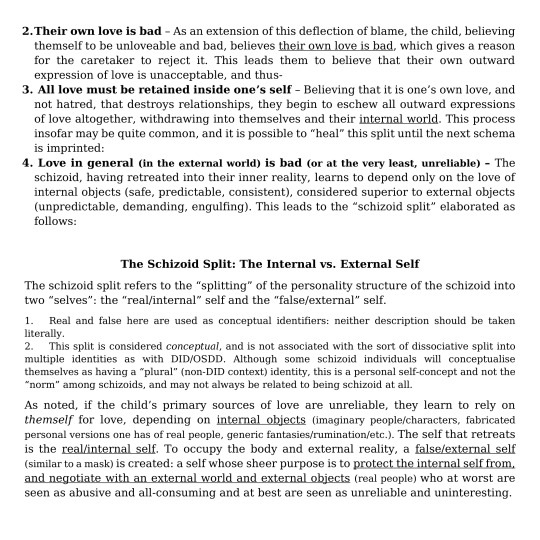
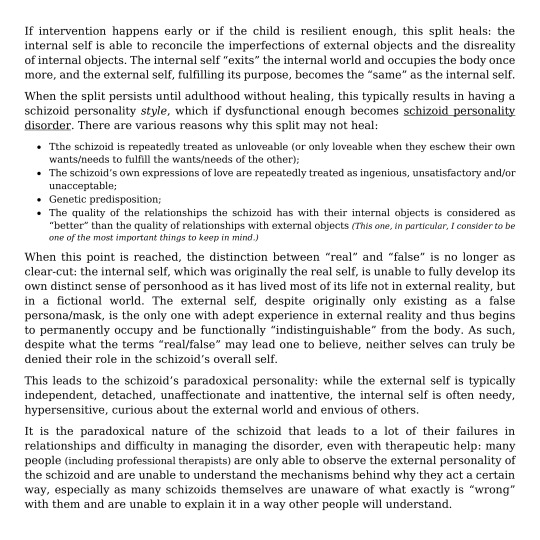

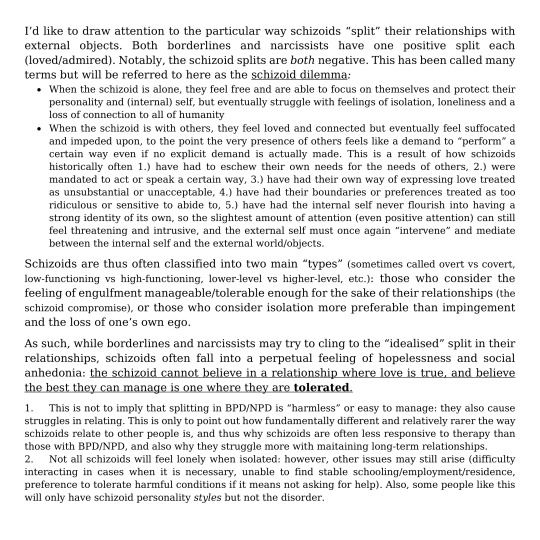
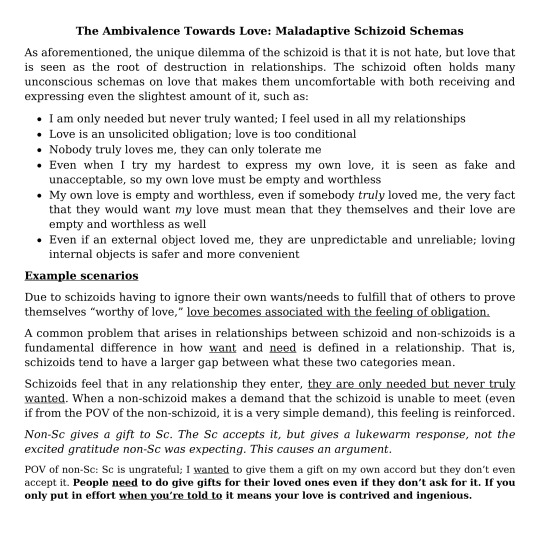

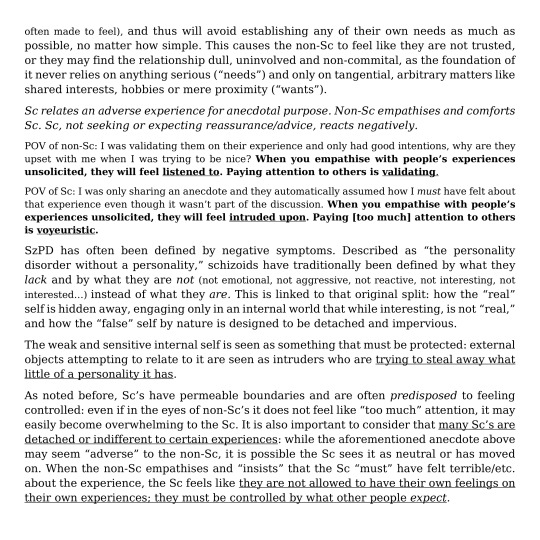

/* Old document. This was originally formatted for Instagram, hence the square pages + nine page limit [ +1 for the cover ] so do forgive if the font is a bit small or some of the explanations had to be condensed!
My goal was an overview of ScPD that delved deeper than just surface-level behaviours, while still being “short and sweet” enough to be understandable even without having read a lot of schizoid literature. There are some comparisons to BPD and NPD to give a clearer understanding of how ScPD splitting works by comparison, but BPD/NPD are not the primary focus of the document. Title was taken from this paper.
The character on the cover is my schizoid webcomic character, Jacques. He isn’t really relevant to the post, I just used an image as a cover so it wouldn’t look weird on the preview on Instagram.
As always, these are mere frameworks and each individual can have their own experiences that are not 1:1 as described here.
Anything that needs further clarification or correction, please message or append in a reblog!
Transcript and additional references below the readmore. */
Keep reading
789 notes
·
View notes
Text
The Hidden Symptoms of Schizoid Personality Disorder
Below are the internal/covert symptoms of schizoid personality disorder.
Hypersensitivity - Doidge (2001) elucidates the etiological hypothesis of schizoid hypersensitivity and ‘hyperpermeability’ through an exploration of what it means to be ‘thin-skinned.’ Like autistic and bipolar patients, Doidge notes the schizoid often shows “an acute nervous hypersensitivity to stimuli, including smells, sounds, light, temperature, and motion, as though they lacked a filter or stimulus barrier” (Doidge, 2001)
Dissociation - As R.D. Laing (1960) notes, in schizoid patients, the relationship to the body has been significantly disrupted. The body is viewed objectively from a distance as if it were a thing or an object unrelated to the self. In short, the body is felt to be unreal, like an empty shell.
Emotional Detachment - For most schizoid people, the smallest surge of emotion feels like a bomb going off. Fearful that any feeling can quickly become overwhelming, the schizoid denies and isolates all his feelings so that this does not occur. He finds little or no pleasures, satisfaction, or enjoyment in life’s activities and has difficulty allowing himself to experience strong pleasurable emotions such as excitement, joy, and pride.
Ego Splitting/Approach Avoidance Conflicts - The central conflict of the schizoid is between his immense longing for relationship and his deep fear and avoidance of relationships (PDM Task Force, 2006). When in relationships, the schizoid maintains a pattern of oscillating towards and away from intimacy, alternatively desiring, and being excited at the chance for contact, and becoming claustrophobic, smothered, choked, imprisoned and terrified of being devoured or smothered by the other. The schizoid then must break free and recover independence (Guntrip, 1969). The oscillation in and out of relationships is the real world enactment of these conflicts around involvement. The schizoid’s legendary avoidance of relationships reflects his assessment that abandonment of others is a lesser evil than facing engulfment and loss of self, despite his longing for relationships (McWilliams, 2004; Seinfeld, 1991).
Existential Dread - When schizoids distance themselves too much from other people, they can be filled with a sense of dread that they will never be able to reconnect. Symptoms include: the feeling that you are dead while you are alive, a feeling that life is inherently meaningless, there is nothing of interest to look forward to, questioning the whole point of living, feelings of despair and terror, being filled with dread, and preoccupation with death and dying.
Withdrawal - Withdrawal has a huge affect on a schizoid’s life because of its tendency to create alienation and loneliness and paralyze interpersonal relations. It is like the feelings have been suddenly drained from the body, leaving only an empty shell to interact with others. Symptoms include: loss of interest, boredom, apathy, autoeroticism, isolation of affect, disgust, revulsion, aversion, passivity, inertia, abandonment of object relationships, and fantasies of a return to the womb or sleep.
This personality disorder is a lot more complex, distressing, and painful than the DSM and ICD make it out to be.
608 notes
·
View notes
Text
Loneliness and Solitude
Blog 2: 14/06/2020
After nearly a month, I’ve returned with another blog post.
I’ve had a few interesting therapy sessions in the meanwhile. It turns out I’ve also got severe depression along with my schizoid personality disorder. Next session we’re starting with EMDR – which is eh… something I don’t fully understand myself - yet. I’ll gladly talk more about it once I have a better idea of what it actually does. It sounds a little bit like hypnosis, but not fully, and it would probably be considered an insult to the practitioner to label it as hypnosis. I might write about it in an upcoming blog post.
But for today, I’d prefer to stick to a topic I understand better. Solitude. Loneliness. The two are not the same for many schizoids.
The shortest way in which I can put it, is to say that many schizoids don’t experience loneliness when they’re alone. But they might feel it when they’re in a group.
Let me elaborate.
Czytaj dalej
25 notes
·
View notes
Photo


Types of people with OCPD
The Teacher/Leader focuses on informing others how to live and what needs to be done.
Healthy: They can be informative guides and mentors, authoritative in the best sense. They are motivated by the power of change.
Unhealthy: They can be controlling bosses and even ruthless bullies, using rules to control everyone else. They can be rigid and authoritarian, insisting that their way is the only way. They can destroy relationships and communities. They may get caught in a Prophet complex, believing they are communicating God’s message to the world.
The Doer/Worker focuses on accomplishing, achieving and fixing. They use lists extensively.
Healthy: They’re very productive and contribute a great deal to the world around them. They’re motivated by accomplishment and mastery.
Unhealthy: They become compulsively manic workaholics who neglect their well-being and their relationships. They may get caught in a Hero complex, destructively overextending themselves.
The Servant/Friend focuses on relationships and helping others.
Healthy: Good team players, they work well with others, creating harmony and finding satisfaction in doing so. They are motivated by alliance and affiliation. They compulsively try to meet expectations.
Unhealthy: People-pleasers in the worst sense, they may be so attentive to the thoughts and needs of others that they lose their authentic voice and what they have to offer. Competing demands drive them crazy because they can’t please everyone. They may become caught in a Sacrificial complex, giving themselves away constantly.
The Thinker/Planner focuses on planning, figuring out the best actions to take and the best way of accomplishing them.
Healthy: They have very high standards and reflect cautiously before taking action. They are motivated by security and quality.
Unhealthy: They tend to be so perfectionistic that they obsess and procrastinate and can’t get anything done. Their strategy is to avoid failing or losing favor by not taking risky chances. They don’t allow themselves to take chances and so never achieve what’s meaningful to them.
Hybrids:
The Driving Leader
Healthy: These inspiring models encourage those around them to be productive through their own example. They may be empathic managers.
Unhealthy: The Slave-Driving Boss who works constantly him- or her-self, and expects everyone else to be as self-sacrificing as he or she is. They may have a Tyrant complex.
The Communal Worker
Healthy: They enjoy being able to actively help others and live in harmony with others though their actions. They are supportive in their family and workplace, and volunteer outside of those.
Unhealthy: They work constantly for others and may become resentful about complying so much. They identify with The Suffering Servant, and may become masochistic.
The Communal Thinker
Healthy: Through planning and reflection they can improve their welfare and that of others around them. They are empathic, receptive listeners and may help others sort out what they feel and think themselves. They brainstorm well with others.
Unhealthy: They become dependent on the opinion of others. They obsess so much about perfecting their reaction to others that they can’t get anything done or forge good relationships. They may suffer from social phobia or inhibition, and they tend to avoid conflict.
The Reflective and Creative Leader
Healthy: In their role as leaders they encourage high standards and thoughtfulness. They may be writers or artists.
Unhealthy: These tend to be Know-It-All’s who tell everyone what to do but achieve little themselves.
- Gary Trosclair, ‘4 Types of Obsessive-Compulsive Personality’, The Healthy Compulsive, 2020.
25 notes
·
View notes
